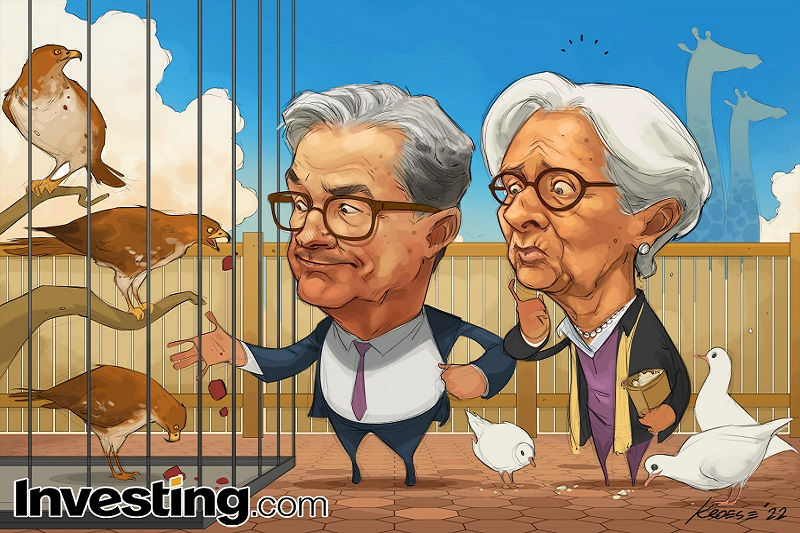By Geoffrey Smith
Investing.com -- It would be an exaggeration to say that the European Central Bank has the hardest job in Europe this week, but the war in Ukraine has made an already tricky balancing act much trickier.
The bank has to steer between two increasingly frightening risks. The invasion, and the Western sanctions against Russia that it triggered, have sent energy prices through the roof, threatening to push inflation – which was already running at a euro-era high in February – higher for longer. That could easily start a wage-price spiral of a kind not seen in Europe for over 30 years.
On the other hand, moving now to tighten financial conditions risks adding inflicting further pain on a Eurozone economy that is only just emerging from the pandemic, sapping confidence among both businesses and households.
“No one can seriously expect the ECB to start normalizing monetary policy at such a moment of high uncertainty,” said ING economist Carsten Brzeski in a note to clients at the weekend. But given the movement in energy prices – and the lack of obvious short-term ways to bring them back down – Brzeski warned that “the eurozone is facing a high risk of stagflation.”
Inflation shot up to 5.8% in February, due largely to energy price movements and apparently not – in contrast to the U.S. and U.K. – supported by any real upward shifts in wages and wage expectations. For the last decade or more, energy - which represents just under 10% of the basket of goods and services that Eurostat uses to determine its inflation figures - has been little more than a distraction for the ECB: volatile from month to month, but essentially in the same grinding downtrend as Eurozone prices more broadly.
All that has changed in recent months. There has been mounting evidence that rising prices have been caused by long-term structural changes – the results of poor planning and policy rather than cyclical effects that are usually corrected by the market before central banks need to worry about them.
Prices this year have reflected not just an incipient war premium, but also longer-running issues affecting energy markets: environmentally-friendly policies that have stunted growth in fossil fuel supply, the inability of OPEC and its allies to satisfy the fuel demand of a recovering global economy, and increasingly acute availability problems at France’s ageing fleet of nuclear reactors.
If things looked bad in February, they have worsened drastically since. Benchmark prices for natural gas, which had bumped along around 15 euros a megawatt-hour since the start of the pandemic, have soared as the Continent has woken up to the awful reality that is dependent for its energy on a repressive, expansionist country that appears determined to assert itself. Futures continued to trade at over 205 euros/MWh on Monday, some 14 times their recent average.
Crude oil prices, meanwhile, which pootled around $60 a barrel in the years before the pandemic, have doubled to over $120 a barrel. Should prices stick around that level for any length of time, consumers will inevitably be hit hard. Money spent on heating the house and getting to work is money that can’t be spent on other goods and services.
Even ECB chief economist Philip Lane – a noted ‘dove’ – said last week that “it is essential to avoid that a spell of temporarily-high inflation pressures – even if arising from a supply shock – becomes entrenched by permanently altering longer-term inflation expectations.”
In the U.S., fluctuations in energy prices tend to redistribute wealth within the country, between regions that are net producers and net consumers. But in Europe, which imports nearly all its energy needs, high energy prices mean a net transfer of wealth out of the region: lower profit margins for companies, less disposable income for consumers.
As a result, says Mark Dowding, chief investment officer of BlueBay Asset Management in London, the hit to Eurozone growth this year is likely to be between 1% and 1.5%, while inflation likely to overshoot previous expectations by the same amount.
The degree of uncertainty is still so high that there seems little it can do except hold tight and wait to see whether high energy prices create more inflation than they destroy growth. Holger Schmieding, head of research at Berenberg Bank, argues that the ECB – unlike the Fed – can afford to hold fire because the Eurozone’s pandemic stimulus created nowhere near the same degree of excess demand.
As such, Brzeski expects Christine Lagarde and her troops to keep to their plan of ending the Pandemic Emergency Purchase Program this month, while shifting some of its bond purchases to a more tightly regulated Asset Purchase Program to avoid withdrawing too much stimulus at once.
By contrast, expectations of interest rate hikes already by the fall – which were raised by Dutch central bank chief Klaas Knot and others last month, now seem rather charmingly dated.
ING’s Brzeski reckons that “if everything goes well, net asset purchases can still end in the third quarter and interest rates can be hiked for the first time before the end of the year.”
That may be. But the last two weeks have left few people willing to assume that everything will go well. Inflation expectations are unlikely to stay in check unless something – anything – is done to bring energy prices down. And that remains as far out of the ECB’s hands as ever.
